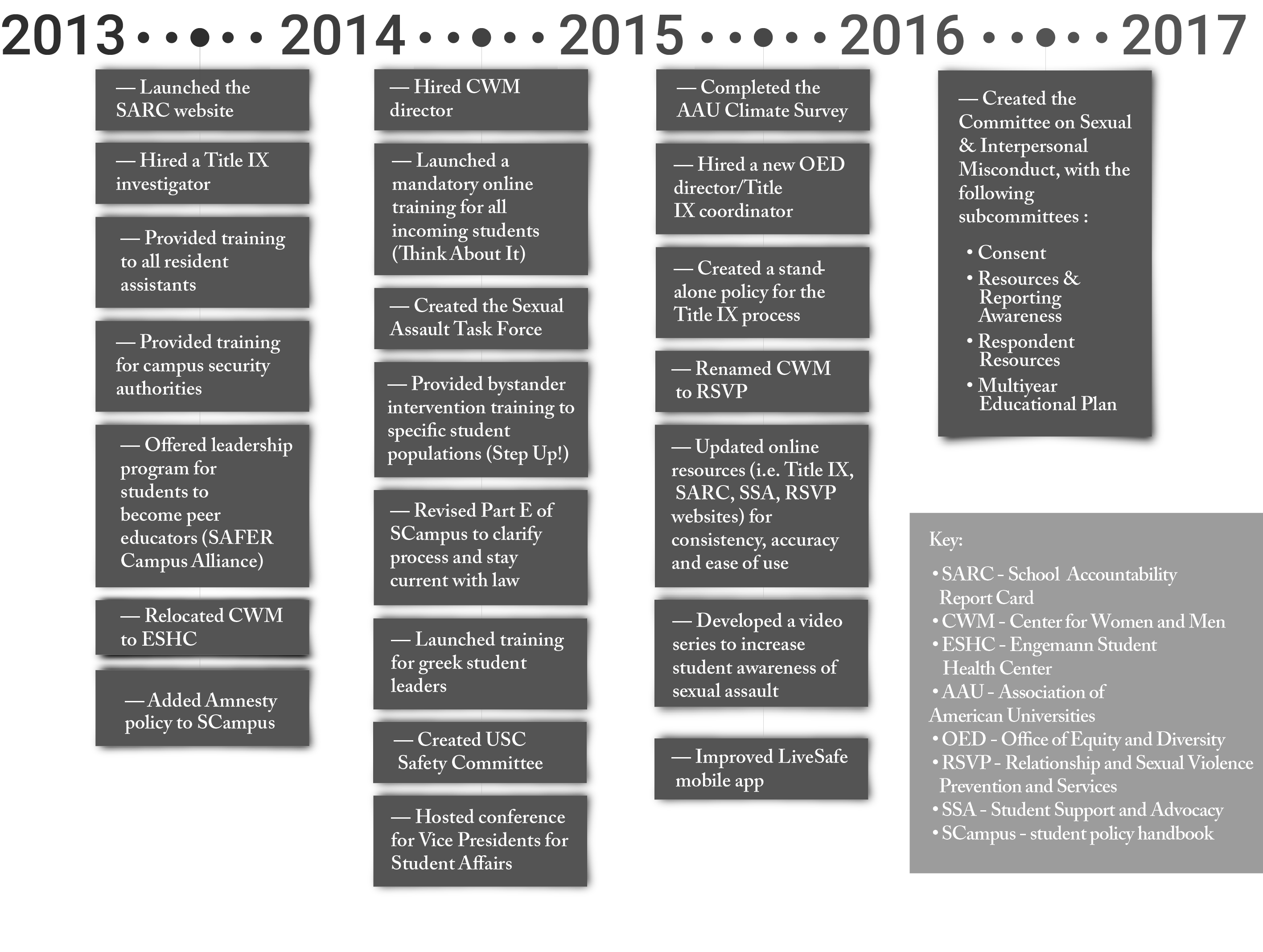Federal government concludes investigation into USC’s Title IX policies, finds USC complied with recommended changes
After a five-year investigation into USC’s Title IX policies and procedures, the U.S. Department of Education’s Office for Civil Rights has concluded its review, entering into an agreement with the University to address compliance concerns and violations identified in the report.
The investigation was opened to review the University’s policies dealing with sexual harassment and assault from 2010 to 2016 after 16 students and alumni filed a complaint in 2013 alleging their cases had been mishandled by USC’s Title IX office.
The Title IX policies and procedures in place for students were found in compliance with Title IX after March 2015, according to a letter from the Office of Civil Rights obtained by the Daily Trojan. The policies applicable to sexual harassment and sexual violence by faculty were found compliant for the 2015-16 school year, while that by staff were found out of compliance for all six years reviewed by the investigation.
USC assessed and revised these policies and procedures aimed at both students and faculty throughout the investigation.

This timeline, published by the Daily Trojan in Spring 2017, shows the changes the University put in place regarding its Title IX office during the federal investigation, between 2013 and 2017. Data provided by Vice President for Student Affairs Ainsley Carry – Michelle Je | Daily Trojan
A news release sent by USC Thursday said that the Office of Civil Rights in their resolution “commended the university” for its proactivity in updating policies and “found the university’s policies compliant as of the close of their investigation.”
Although the letter from OCR acknowledges the university’s efforts, it does not specifically commend them. The resolution agreement leaves USC with the possibility of continued monitoring of outstanding Title IX violations found during the investigation.
One of USC’s violations mentioned in the letter was originally not including the name and contact information for the Office of Equity and Diversity director in the Faculty Handbook. USC said it amended the handbook in 2018. The OCR said it would monitor USC to ensure that these changes were made.
The University addressed the issues brought up by the OCR in their processes prior to March 2015 as the investigation took place. These included concerns with the absence of a designated timeframe for the process, the lack of equal opportunity for complainants and respondents to present witnesses and evidence and the lack of assurance that the University would take steps to prevent recurrences.
Alexa Schwartz, one of the former students who filed one of the 2013 complaints investigated by OCR in 2013, said that she was proud of having spoken out and for “breaking the silence.”
“We are seeing a new and hopefully lasting era of #MeToo where people are less ashamed to speak out,” she said. “Most important to me is that students who report are treated with respect and not neglected or harmed further, and that the university does all it can to prevent incidents of sexual violence.”
According to the letter from OCR, investigation interviews found that “staff members reported that different offices are responsible for determining and implementing interim measures and that they do not coordinate their responses.”
However, it found the three coordinators during the six-year investigation had “adequate background and training.”
“While we are gratified that this investigation has concluded, our work on improvement is always ongoing,” said Gretchen Dahlinger Means, executive director of Equity and Diversity and Title IX coordinator, in the news release. “We will continue to strive to set the standard in Title IX response.”
Means came to USC during the investigation and thus was not a part of the 2013 complaints.
During the investigation, USC amended how it deals with sexual assault prevention and victim reporting. The University added a coordinator to improve training of campus security authorities, Means told the Daily Trojan in August 2016.
Through the investigation, USC has implemented preventative measures by requiring students to take online courses such as “AlcoholEdu” and “On the Safe Side” to educate about consent before registering for classes.
“Our goal has been a compassionate and caring response to all of our students,” Vice President for Student Affairs Ainsley Carry said in a USC news release. “We seek to balance the rights of individual students with campus safety considerations and our commitment to foster a safe learning environment that is free from harassment and discrimination.”
USC was one of 55 schools named in 2014 that were investigated regarding their handling of sexual harassment and assault.
Ohio State University was one of the schools. It came to a resolution in September 2014 to review its policies with issues related to sexual misconduct. OSU agreed to take new steps to change how it dealt with those issues. Similarly, Harvard Law School reached a resolution agreement in December 2014, as did University of Virginia in September 2015.
